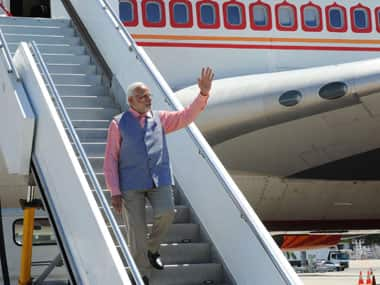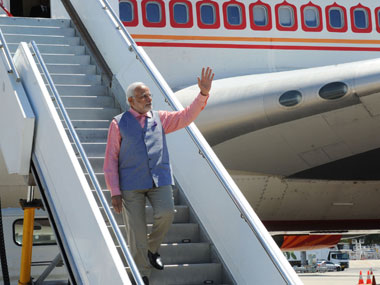Prime Minister Narendra Modi’s just-started three-nation tour of France (9-11 April), Germany (12-14 April) and Canada (14-17 April) should be seen as his government’s outreach to G7 industrialised democracies all of which are set to perform a key role in his scheme of things for India’s development. [caption id=“attachment_2191185” align=“alignleft” width=“380”]
 Prime Minister Narendra Modi. Image courtesy PIB[/caption] If India’s aspirations for playing a bigger role in global politics are to be met, these three countries’ nod is a prerequisite. PM Modi will be pushing his pet schemes like Make in India, Skill India, Swachh Bharat and river cleaning in all three countries. Let us have a closer look at each of the three countries the prime minister is visiting. France: Apart from the traditional areas of defence, space and nuclear, India has to learn a lot from this country in areas like tourism, smart cities and river cleaning. It itself is a telling fact that though the population of France is 66 million it attracts 82 million tourists per year. Imagine India getting more than 1.2 billion tourists per year! In contrast, India gets a measly less than seven million tourists per year. France is crucial for India as it plays an influential role globally particularly in such multilateral major international bodies as UN Security Council, Nato, G7, G20 and the EU. The country has a GDP of $2.7 trillion as per official exchange rate and GDP per capita of $35,700. No wonder then in view of the huge economic clout of France, PM Modi will be having two back to back roundtables on 10 April – one with French CEOs with infrastructure as a theme and the second with French CEOs with defence technology as a theme. Foreign secretary S Jaishankar had this to say about these two meetings: “On infrastructure, as you know it is something which is a very high priority for the government and we do believe a lot of French companies have expertise and capabilities to contribute. In the case of defence, for us our relationship with France traditionally has had defence, space and nuclear as three important facets of that relationship. French companies are very capable, very experienced in the defence side, and we hope that the roundtable with French defence companies would lead to their taking interest in Make in India investments in India in the defence side.” After PM Modi’s delegation-level talks with French President Hollande on 10 April, the two leaders would together receive a report of the India-France CEOs Forum containing a set of recommendations on how to re-energize Indo-French ties. This will be followed by their boat ride on the Seine River, a “Naav pe charcha” which is expected to dominate the media. On 11 April, PM Modi would be travelling to Toulouse where he will tour the Airbus facility. India has been looking at France as a partner for technology transfer and investments and Airbus can just do that. Incidentally, Airbus has already been working with different Indian companies. Germany: PM Modi’s main focus in Europe’s largest economy and second most populous nations of the continent will inevitably be Make in India. The steady decline of Russia since the break-up of the Soviet Union has coincided with simultaneous rise of Germany. The clout of Germany has risen rapidly as evidenced by its involvement in negotiations with Iran over that country’s nuclear programme. The German economy, which is the world’s fifth largest in PPP terms, is a leading exporter of machinery, vehicles, chemicals, and household equipment and has a highly skilled labour force. Modi’s objective is to bring the two economies closer and dip into German expertise to boost its own manufacturing sector. He will in fact be reaching Hannover first and plunge into meetings with German business leaders. Hannover has been picked up as the destination as India is the partner country for the Hannover Messe, the Hannover Fair, this year and over 400 Indian companies are participating in the fair and have taken more than 7,500 square metres of space. This will be an ideal launching pad for Modi to introduce his Make in India scheme to the German business community. On 13 April, Modi will be holding delegation-level talks with German Chancellor Angela Merkel in Berlin. Before his departure for Ottawa (Canada) the next day, the prime minister would be touring a railway station in Berlin to get first hand ideas of improving the Indian Railways. Canada: Issues like trade, investment, education, immigration and nuclear will dominate PM Modi’s discussions with his Canadian counterpart Stephen Harper. This will be the first stand-alone prime ministerial visit from India to Canada in 42 years. Canada is a high-tech industrial society in the trillion dollar class and has striking parallels with the US in its market-oriented economic system. With a GDP of $1.8 trillion at official exchange rate, ranked at 14th globally, Canada enjoys a high per capita GDP of over $43,000. Interestingly, Canada’s top five pension funds alone control nearly $700 billion assets which offers great investment potential for India. Besides, Canada also is an energy superpower, home to some of the best universities and research institutes, and has a very vibrant Indian origin community of 1.2 million. PM Modi will be visiting three Canadian cities – Ottawa, Toronto and Vancouver. This is how Ramachandran Swaminathan, Special Secretary (Americas) in the Ministry of External Affairs, summed up the Canada leg of PM Modi’s three-nation tour: “I would say the overall objectives that we want to achieve during the visit would be to elevate, diversify and deepen our engagement across a whole range of fields; I would also say impart new vigour through concrete steps, and also establish linkages in terms of key areas particularly energy, trade and investment cooperation, collaboration in skills development, education, science and technology as well as space; and also strengthen linkages in the field of security cooperation including counterterrorism and emerging areas of non-traditional security including cyber threat.”
Prime Minister Narendra Modi. Image courtesy PIB[/caption] If India’s aspirations for playing a bigger role in global politics are to be met, these three countries’ nod is a prerequisite. PM Modi will be pushing his pet schemes like Make in India, Skill India, Swachh Bharat and river cleaning in all three countries. Let us have a closer look at each of the three countries the prime minister is visiting. France: Apart from the traditional areas of defence, space and nuclear, India has to learn a lot from this country in areas like tourism, smart cities and river cleaning. It itself is a telling fact that though the population of France is 66 million it attracts 82 million tourists per year. Imagine India getting more than 1.2 billion tourists per year! In contrast, India gets a measly less than seven million tourists per year. France is crucial for India as it plays an influential role globally particularly in such multilateral major international bodies as UN Security Council, Nato, G7, G20 and the EU. The country has a GDP of $2.7 trillion as per official exchange rate and GDP per capita of $35,700. No wonder then in view of the huge economic clout of France, PM Modi will be having two back to back roundtables on 10 April – one with French CEOs with infrastructure as a theme and the second with French CEOs with defence technology as a theme. Foreign secretary S Jaishankar had this to say about these two meetings: “On infrastructure, as you know it is something which is a very high priority for the government and we do believe a lot of French companies have expertise and capabilities to contribute. In the case of defence, for us our relationship with France traditionally has had defence, space and nuclear as three important facets of that relationship. French companies are very capable, very experienced in the defence side, and we hope that the roundtable with French defence companies would lead to their taking interest in Make in India investments in India in the defence side.” After PM Modi’s delegation-level talks with French President Hollande on 10 April, the two leaders would together receive a report of the India-France CEOs Forum containing a set of recommendations on how to re-energize Indo-French ties. This will be followed by their boat ride on the Seine River, a “Naav pe charcha” which is expected to dominate the media. On 11 April, PM Modi would be travelling to Toulouse where he will tour the Airbus facility. India has been looking at France as a partner for technology transfer and investments and Airbus can just do that. Incidentally, Airbus has already been working with different Indian companies. Germany: PM Modi’s main focus in Europe’s largest economy and second most populous nations of the continent will inevitably be Make in India. The steady decline of Russia since the break-up of the Soviet Union has coincided with simultaneous rise of Germany. The clout of Germany has risen rapidly as evidenced by its involvement in negotiations with Iran over that country’s nuclear programme. The German economy, which is the world’s fifth largest in PPP terms, is a leading exporter of machinery, vehicles, chemicals, and household equipment and has a highly skilled labour force. Modi’s objective is to bring the two economies closer and dip into German expertise to boost its own manufacturing sector. He will in fact be reaching Hannover first and plunge into meetings with German business leaders. Hannover has been picked up as the destination as India is the partner country for the Hannover Messe, the Hannover Fair, this year and over 400 Indian companies are participating in the fair and have taken more than 7,500 square metres of space. This will be an ideal launching pad for Modi to introduce his Make in India scheme to the German business community. On 13 April, Modi will be holding delegation-level talks with German Chancellor Angela Merkel in Berlin. Before his departure for Ottawa (Canada) the next day, the prime minister would be touring a railway station in Berlin to get first hand ideas of improving the Indian Railways. Canada: Issues like trade, investment, education, immigration and nuclear will dominate PM Modi’s discussions with his Canadian counterpart Stephen Harper. This will be the first stand-alone prime ministerial visit from India to Canada in 42 years. Canada is a high-tech industrial society in the trillion dollar class and has striking parallels with the US in its market-oriented economic system. With a GDP of $1.8 trillion at official exchange rate, ranked at 14th globally, Canada enjoys a high per capita GDP of over $43,000. Interestingly, Canada’s top five pension funds alone control nearly $700 billion assets which offers great investment potential for India. Besides, Canada also is an energy superpower, home to some of the best universities and research institutes, and has a very vibrant Indian origin community of 1.2 million. PM Modi will be visiting three Canadian cities – Ottawa, Toronto and Vancouver. This is how Ramachandran Swaminathan, Special Secretary (Americas) in the Ministry of External Affairs, summed up the Canada leg of PM Modi’s three-nation tour: “I would say the overall objectives that we want to achieve during the visit would be to elevate, diversify and deepen our engagement across a whole range of fields; I would also say impart new vigour through concrete steps, and also establish linkages in terms of key areas particularly energy, trade and investment cooperation, collaboration in skills development, education, science and technology as well as space; and also strengthen linkages in the field of security cooperation including counterterrorism and emerging areas of non-traditional security including cyber threat.”
Consulting Editor, Firstpost. Strategic analyst. Political commentator. Twitter handle @Kishkindha.
)